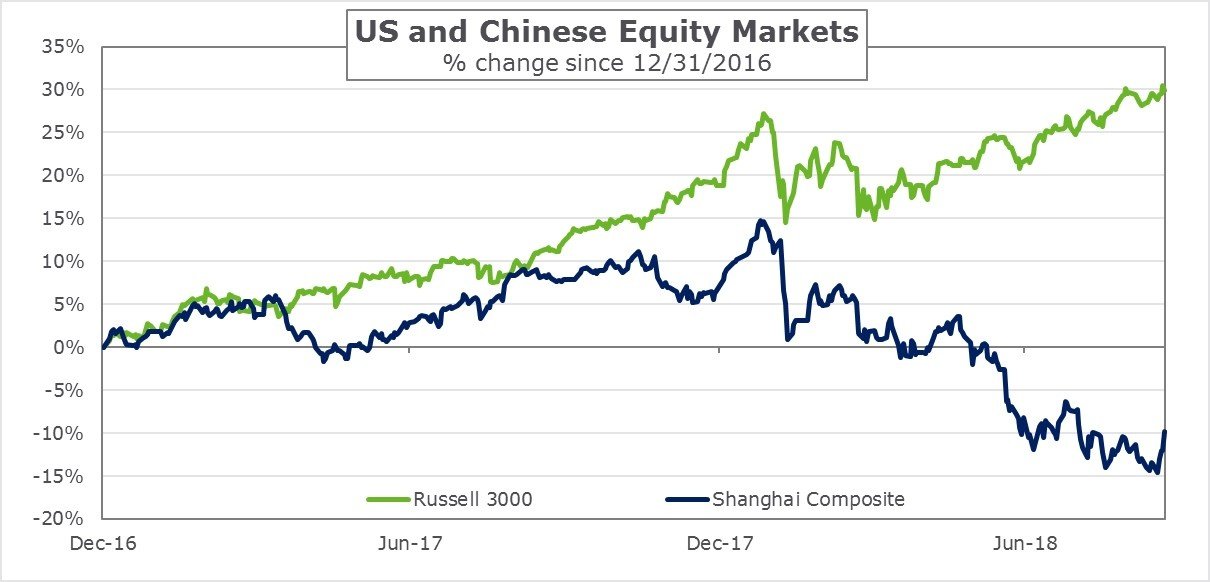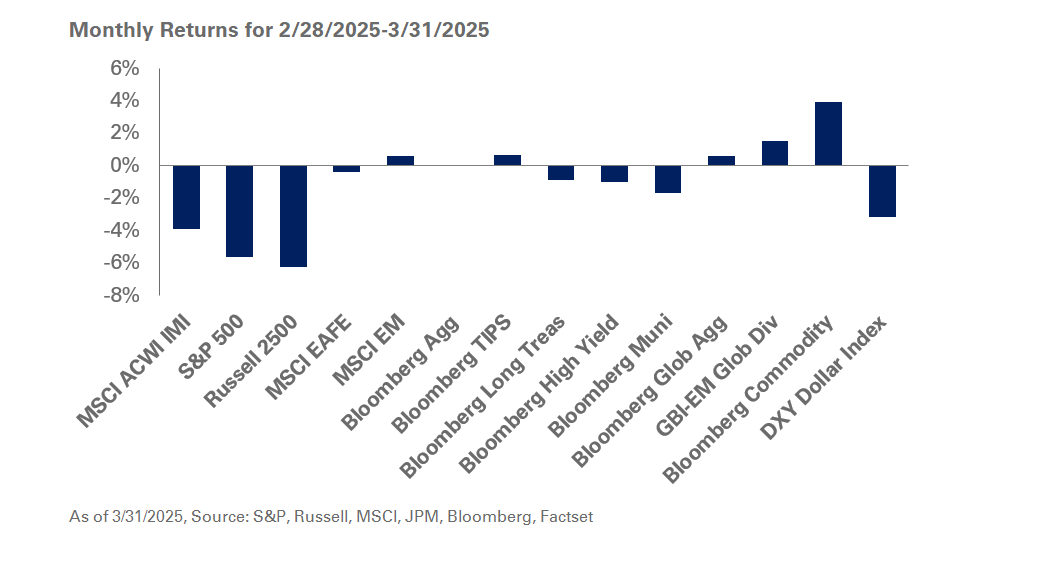Stock up early this year for the holidays as the escalating trade dispute between the United States and China threatens to raise prices on consumer goods.
As the world’s two largest economies face off, the stakes are huge with the US and China exchanging nearly $650 billion in goods each year. The prevailing uncertainty around the outcome is beginning to spill over into some corners of the market. The Shanghai Composite has lost 15% so far this year with the yuan down around 5%. So far, US equities have shrugged off concerns with the Russell 3000 rising nearly 10% during the same period on the back of strong economic and earnings figures.
Investors fear the possibility of the trade skirmish snowballing into a full-fledged trade war with the potential to drag down the global economy. For now, we believe the likelihood of a global recession is low. In fact, we believe higher levels of volatility among currencies and equities can lead to buying opportunities. Market sell-offs driven by US-China trade tensions may offer an attractive entry point. We maintain our overweight recommendation on non-US equities where valuations are more favorable. At the same time, we encourage clients to increase their holdings of safe-haven fixed-income securities, for instance, Treasuries, given the increased potential for market instability.
The ongoing trade dispute underscores one of NEPC’s current key market themes, globalization backlash, which we first introduced in 2016. At the time, we noted the wave of populist sentiment arising from rampant disillusionment with political establishments and an uneven economic recovery in the developed world. This year, the backlash migrated from the political arena to trade relationships. In this piece, we examine how the US-China dispute may play out and the potential outcomes for investment markets.
The Good
In this scenario, the trade dispute doesn’t morph into a trade war. It ends with a mutually beneficial pact serving the best interests of both the US and China. In this instance, leaders skillfully manage negotiations to appease domestic political concerns while implementing limited tariffs and/or trade limitations. Investors in China would be particularly rewarded, likely providing a meaningful bounce back in equities. While the negotiation process may be messy and protracted, spurring market volatility, the outcome would be the most appealing for riskier assets while creating buying opportunities.
The BAD
In this case, the United States and China continue their sparring, modestly impacting real economic growth rates. Equity and currency volatility would likely be elevated and the pain of rising tariffs would likely weigh on consumer spending and foreign direct investment. As markets often overreact to geopolitical concerns, higher levels of volatility could provide ample buying opportunities for disciplined investors, specifically in emerging market equities. Nonetheless, greater trade barriers could lead to a souring of market sentiment and declines in risk assets both in the United States and China.
The UGLY
The path of this outcome will be much like a tidal wave hitting land; nobody will know the exact height of the wave, but it will almost certainly inflict serious damage. In this instance, relations between the US and China would suffer further strain, with the dispute potentially moving beyond tariffs and involving severe protectionist policies such as the closing-off of markets or disruptions in technology supply chains. The rift would likely spill over onto the global stage, potentially dragging the world economy into a recession or worse. While trade restrictions of this scale have not been seen since the 1930s (remember the Smoot-Hawley Tariff Act?), present day global trade is far bigger and more complex; abrupt changes to its rhythm could inflict substantial damage, potentially destabilizing the world economy.
SO, which one will it be?
We believe the two nations will take the mid path, continuing with their skirmishes but without long-lasting consequences. This likely scenario could continue to disrupt market sentiment, but will have limited impact on real economic growth. We wouldn’t even be surprised if the US and China decide to cease and desist with a mutually beneficial trade treaty, which would be a significant lift for equity markets outside the US. For now, we think a full-blown trade war represents a low-probability tail risk.
To this end, we view our theme of a globalization backlash as a longer-term trend, likely leading to higher volatility in stocks and currencies. We encourage our clients to remain alert for potential buying opportunities that may arise from this volatility. We maintain our overweight recommendation on non-US equities, which have greater potential for growth. We also urge investors to increase their holdings of safe-haven fixed-income debt that would serve to mitigate market instability. If you have questions on your investment portfolio, please call your NEPC consultant today.
Source: Bloomberg




